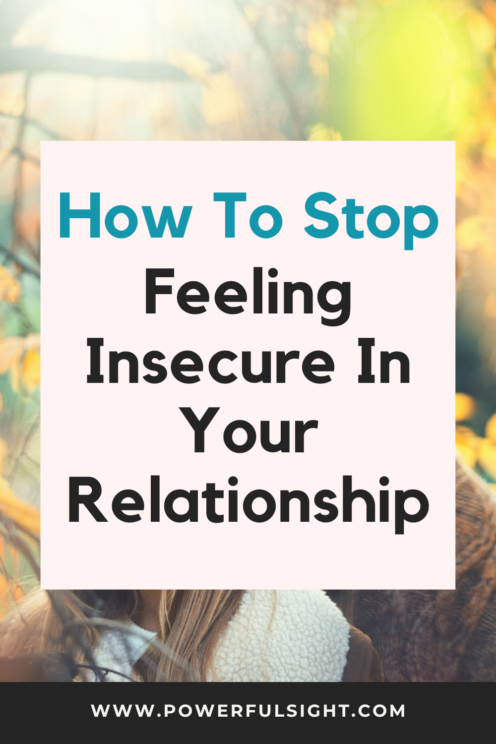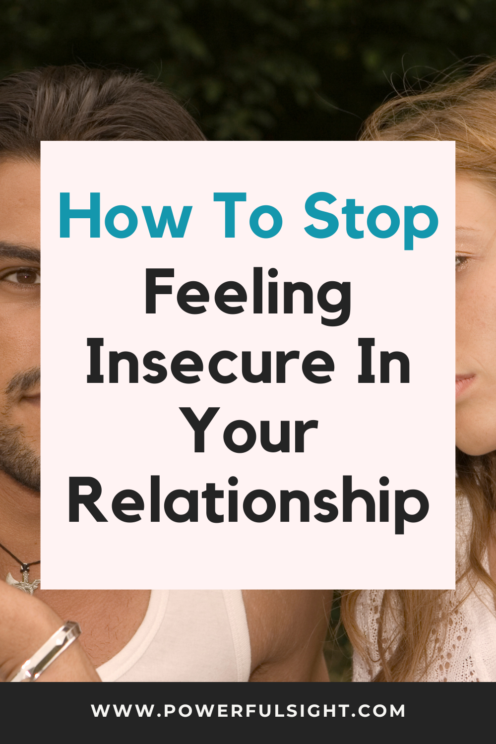Do you find yourself feeling insecure in your relationship and constantly doubting your partner’s love and commitment? You’re not alone. Insecurity can stem from various factors such as past experiences, low self-esteem, or unresolved trust issues. However, it’s important to recognize that these feelings can be detrimental to your relationship if left unchecked. Insecurity can hinder the progress of your relationship. Here are tips on how to stop feeling insecure in your relationship
Understanding Insecurity in Relationships
Insecurity in relationships often arises from deep-rooted fears and insecurities within ourselves. It’s crucial to understand that these feelings are not a reflection of your partner’s actions or lack of love, but rather a result of your own internal struggles. By acknowledging and accepting this, you can begin the journey towards overcoming your insecurities.
The Impact of Insecurity on Relationships
Insecurity can have a significant impact on your relationship. Constant doubt and mistrust can erode the foundation of love and intimacy, leading to a cycle of insecurity and conflict. It’s essential to recognize the toll it takes on both you and your partner.
Insecurity often leads to controlling behaviors, jealousy, and constant reassurance-seeking. These behaviors can suffocate your partner and create an unhealthy dynamic. It’s crucial to break free from this cycle and create a safe space where both partners can thrive.
Furthermore, insecurity can hinder effective communication and emotional connection. When you’re constantly questioning your partner’s motives or doubting their love, it becomes challenging to engage in open and honest conversations. This lack of communication can lead to misunderstandings and further exacerbate feelings of insecurity.
Save the pin for later

How to stop being insecure in your relationship
1. Improve your Communication skills
One of the most crucial steps in overcoming insecurity is to establish open and honest communication with your partner. Effective communication allows for the expression of fears, concerns, and needs, fostering understanding and empathy.
Start by creating a safe space for open dialogue. Set aside dedicated time to have conversations that focus on your feelings and insecurities. Avoid blaming or accusing your partner, and instead, use “I” statements to express how their actions or words make you feel.
Active listening is also key to effective communication. Give your partner your full attention, without interrupting or formulating a response in your mind. Seek to understand their perspective and validate their emotions, even if they differ from your own.
Related: How to deal with jealousy in a relationship
2. Build trust in your relationship
Building trust is another vital component of combating insecurity. Trust is the foundation of any healthy relationship, and without it, insecurity thrives. Trust is built through consistent actions, honesty, and reliability.
To cultivate trust, follow through on your commitments and promises. Be transparent in your actions and communicate openly about your intentions. Trust is a two-way street, so ensure that you also trust and support your partner in return.
3. Build Self-Confidence
Low self-esteem and self-worth often contribute to feelings of insecurity in relationships. Building self-confidence is essential in overcoming these insecurities and creating a healthier dynamic with your partner.
Start by recognizing and challenging your negative self-talk. Replace self-critical thoughts with positive affirmations and reminders of your worth. Celebrate your accomplishments, no matter how small, and focus on your strengths.
Related: How to deal with your insecurities
4. Set Healthy Boundaries in Your Relationship
Boundaries are crucial in any relationship, as they define and protect individual needs and values. Insecurity often arises when boundaries are blurred or violated. Setting and maintaining healthy boundaries is essential in creating a secure and respectful partnership.
Start by clearly communicating your boundaries to your partner. Be assertive in expressing your needs and expectations. It’s important to remember that setting boundaries is not about controlling or manipulating your partner, but rather about taking ownership of your own well-being.
Respect your partner’s boundaries as well. Listen to their needs and concerns and make an effort to honor them. Healthy boundaries involve mutual respect and consideration for each other’s emotional and physical boundaries.
Consistency is key in maintaining boundaries. Be firm in enforcing your boundaries and communicate any changes or adjustments clearly. Remember that boundaries can evolve over time, and it’s essential to have ongoing conversations with your partner to ensure that both parties feel heard and respected.
By setting and respecting healthy boundaries, you create a sense of safety and security within your relationship, reducing feelings of insecurity and fostering trust and mutual understanding.
5. Overcome Past Traumas and Insecurities
Past traumas and insecurities can significantly impact your current relationship. Unresolved issues from past experiences can manifest as trust issues, fear of abandonment, or a general sense of insecurity. Addressing and healing these wounds is essential in creating a more secure and fulfilling connection with your partner.
Seeking therapy or counseling can be a valuable tool in overcoming past traumas and insecurities. A trained professional can guide you through the healing process, providing support and strategies to address the underlying causes of your insecurity.
Engage in self-reflection and journaling to explore your past experiences and how they may be influencing your present relationship. Identify patterns and triggers, and work on reframing your perspective. Remember, you are not defined by your past, and you have the power to shape your future.
Communication with your partner is also crucial in navigating past traumas. Share your experiences and fears with them, allowing them to understand your perspective and offer support. A loving and understanding partner will be willing to work through these challenges with you and help create a safe and secure environment.
Healing from past traumas takes time and patience. Be kind to yourself throughout the process and celebrate your progress, no matter how small. By addressing and overcoming these insecurities, you can create a stronger foundation for a loving and secure relationship.
6. Seek Professional Help for Relationship Insecurity
In some cases, relationship insecurity may require professional intervention. If you find that your insecurity is significantly impacting your daily life, mental well-being, and relationships, seeking help from a therapist or counselor can be highly beneficial.
A professional can provide guidance, support, and strategies tailored to your specific needs. They can help you explore the root causes of your insecurity, develop coping mechanisms, and work towards building a healthier relationship dynamic.
Therapy can also be beneficial for couples experiencing insecurity together. A skilled therapist can facilitate open and honest communication, help identify and address underlying issues, and provide tools for building trust and security within the relationship.
Remember, seeking professional help is not a sign of weakness but rather a proactive step towards personal growth and healing. With the right support, you can overcome insecurity and cultivate a more fulfilling and secure relationship.
6. Build Self-Care
Self-care plays a significant role in reducing relationship insecurity. Taking care of your physical, emotional, and mental well-being is crucial in creating a solid foundation for a healthy relationship.
Engage in activities that bring you joy and relaxation. Whether it’s practicing mindfulness, exercising, spending time in nature, or pursuing creative outlets, prioritize self-care as an essential part of your routine. When you prioritize your own well-being, you become more resilient and better equipped to handle relationship challenges.
Nurture your support system. Surround yourself with friends and family who uplift and support you. Seek out positive influences and engage in meaningful connections. Having a strong support system can provide you with the validation and encouragement needed to overcome insecurity.
Practice self-compassion and self-love. Treat yourself with kindness and understanding, acknowledging that you are worthy of love and respect. Practice positive self-talk, and challenge any negative beliefs or thoughts that contribute to insecurity. Remember, you are deserving of a loving and secure relationship.
7. Strengthen the Bond with Your Partner
Building a strong and secure bond with your partner is essential in alleviating insecurity. By actively working on your relationship and fostering closeness, you can create a sense of safety and trust.
Engage in activities together that promote connection and intimacy. Whether it’s going on regular date nights, planning trips, or engaging in shared hobbies, spending quality time together strengthens the emotional bond.
Express love and appreciation for your partner regularly. Verbalize your affection, express gratitude for their support, and show appreciation for their presence in your life. Small gestures of love go a long way in creating a secure and fulfilling relationship.
Practice forgiveness and let go of past hurts. Holding onto grudges or dwelling on past mistakes only fuels insecurity and erodes trust. Learn to forgive and move forward, focusing on the present and future rather than dwelling on the past.
Final thoughts
Feeling insecure in your relationship is a common struggle, but it doesn’t have to define your relationship. Follow the tips above to deal with insecurity in your relationship from today.
Save the pin for later

- How to Find a Good Divorce Lawyer for Consultation - 14/06/2025
- 10 Best Personal Development Courses Online - 16/05/2025
- 157 Charming Vintage Baby Names (With Meanings) - 12/05/2025